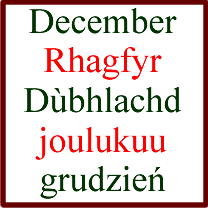
In many languages this month is known as December, or something similar, which comes ultimately from the Latin *decumo-mēnsris (of the tenth month) – the Roman calendar started in March (mārtius) [source].
However in some languages December has a completely different name:
In Welsh December is Rhagfyr [ˈr̥aɡvɨ̞r], which means the ‘foreshortening’, from rhagfyrhau (to foreshorten), from rhag (a prefix with various meanings) and byr (short, small) [source].
In Breton December is miz Kerzu [miz ˈkɛʁ.zy] – which means ‘very dark month’. The Cornish for December is similar and has the same meaning: Mys Kevardhu [source].
In Scottish Gaelic December is Dùbhlachd, From dubh (dark), so it’s a dark time [source].
In Irish December is Mí na Nollag (the month of Christmas). Nollag is the genetive of Nollaig, which comes from the Old Irish Notlaic (Christmas), from Latin nātālīcia (a birthday party), from nātālis (natal), from nātus (born) [source].
In Finnish December is joulukuu (Christmas/yule moon) [source], which was also the meaning of the Old English word for this month: Gēolmōnaþ.
In Czech December is prosinec [prɔsɪnɛt͡s], which comes from prosinoti (flashing, shining) [source].
In Polish December is grudzień [ˈɡru.d͡ʑɛɲ], from the Proto-Slavic *grudьnъ, from *gruda (heap, lump) & *-ьnъ [source].
Are there interesting names for December in other languages?
Don’t forget Frimare/Nivôse (frosty/snowy) from the French Revolutionary calendar. (Their months started around the 22nd of our months, so there are two revolutionary months that cover December.)
Lithuanian has gruodis – presumably cognate with Polish grudzień (which, according to Wiktionary, comes from Proto-Slavic gruda – ‘heap’, ‘lump’).
Latvian nowadays uses the Latin names for all the months of the year, hence decembris – but there is an older set of names, in which ‘December’ is vilku mēnesis (‘the month of wolves’).
https://lv.wikipedia.org/wiki/Mēnesis#Jūlija_un_Gregora_kalendārs
Interesting that Latvian had a “wolf month”, David. In Basque, February is “Otsail” (otso (wolf) + hil (moon) as in hilabete (full moon = month)). December is abendua, which I presume is a loan with the same Latin root as our “advent”.